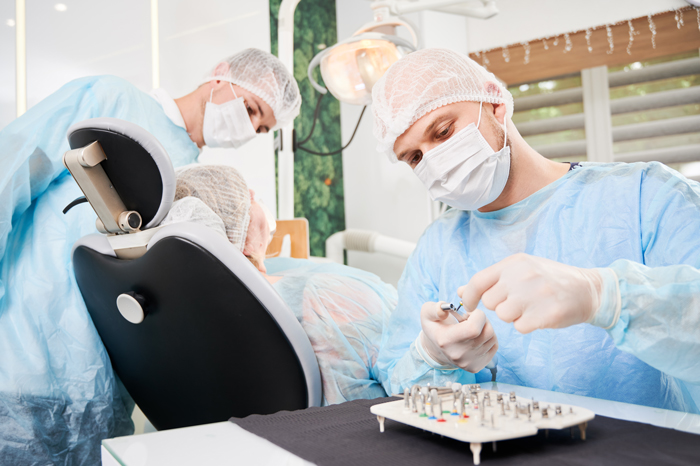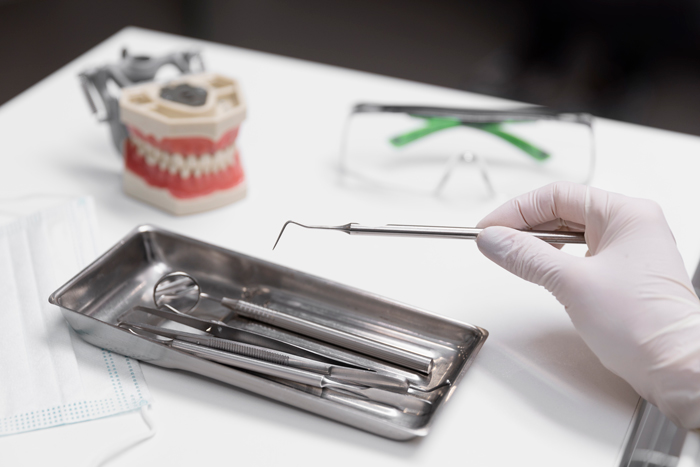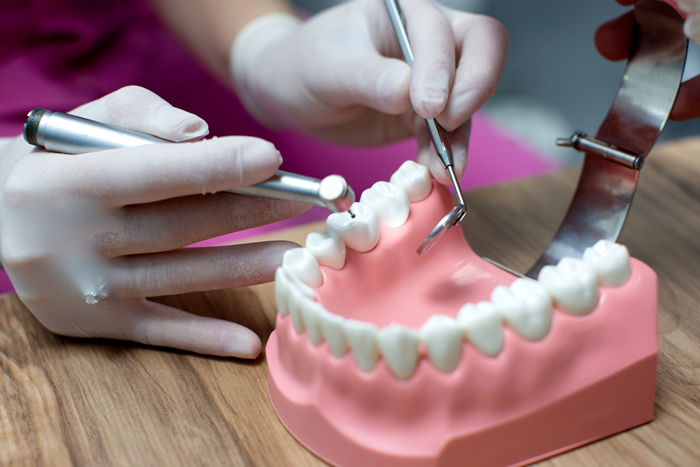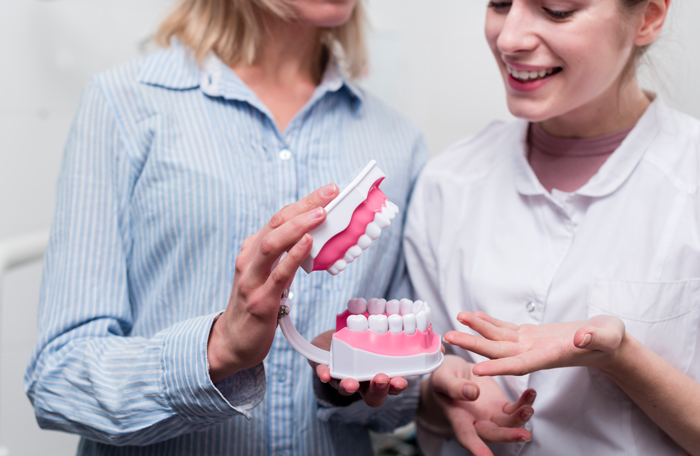All-on-4 Dental Implants in Broomfield, CO
What are All-On-4 Dental Implants?
All-On-4 Dental Implants are a revolutionary dental treatment that offers a permanent solution for individuals suffering from significant tooth loss or those who have struggled with traditional dentures. Unlike traditional dentures, All-On-4 Dental Implants provide a long-term solution that feels and functions like natural teeth.
The procedure involves the strategic placement of four dental implants to support a full arch of prosthetic teeth. These implants are designed to fuse with the jawbone, providing stability and preventing further bone loss.
The All-On-4 technique utilizes angled implants, which maximize the use of available bone and eliminate the need for bone grafting in most cases.
Who Can Have All-on-Four Implants?
The All-on-4 procedure is a dental implant treatment that can replace a full arch of missing teeth. However, not everyone is a suitable candidate for this procedure.
To be a candidate for All-on-4, you must have:
- Adequate bone density: The All-on-4 procedure uses angled implants that maximize the use of available bone. Therefore, you must have sufficient jaw bone to support the implants.
- Healthy gums: You must be free from any active periodontal disease or gum disease.
- Good overall health: You must have your chronic conditions under control, such as diabetes.
If you are missing a entire arch of teeth and meet the above criteria, you may be a good candidate for All-on-4. Talk to your dentist or oral surgeon to learn more about this procedure and whether it is right for you.

The Steps of an All-on-4 Dental Procedure At Colorado Gum Care
1: Consultation
The consultation process is a crucial step in the All-On-4 dental implant procedure, allowing the dental team to assess the patient’s suitability for the treatment and create a personalized treatment plan.
During this initial appointment at our dental practice in Broomfield, CO, our experienced oral surgeon will carefully evaluate your oral health and discuss your treatment options.
This assessment involves a comprehensive evaluation of your teeth, gums, and jawbone. X-rays and CT scans may be taken to determine the bone density and suitability for dental implant placement. Furthermore, we will discuss your dental history, any existing dental issues, and your desired outcome.
Based on your examination results, our dental team along with the oral surgeon Broomfield will develop a customized treatment plan tailored to meet your specific needs. This plan will outline the number and placement of the dental implants, any necessary extractions or bone grafting procedures, and the expected timeline for the treatment.
2: Exam
The examination process for the All-On-4 Broomfield dental procedure is an essential step in determining the suitability and success of the treatment. At our dental practice in Colorado Gum Care, we conduct a thorough examination to gather all the necessary information and assess the patient’s dental condition.
The examination consists of several steps aimed at evaluating the teeth, gums, and jawbone. First, our experienced oral surgeon will carefully examine your oral health by visually inspecting your teeth and gums. This allows us to identify any existing dental issues, such as tooth decay or gum disease, that may need to be addressed prior to the All-On-4 dental implants Broomfield procedure.
By conducting a thorough examination, we can develop a comprehensive treatment plan tailored to your specific needs. This plan will outline the number and placement of the dental implants, any necessary extractions or bone grafting procedures, and the expected timeline for the treatment.
3: Treatment Plan
At Colorado Gum Care Broomfield, we create customized treatment plans for each patient based on their specific needs and oral health condition.
The first step is a thorough examination of the teeth, gums, and jawbone. We may also use diagnostic imaging techniques to assess the bone density and overall health of the jawbone.
Based on this information, we develop a comprehensive treatment plan that outlines the number and placement of the dental implants, any necessary extractions or bone grafting procedures, and the expected timeline for the treatment.
This ensures that each patient receives individualized care and optimal results.
4: Procedure
The procedure begins with a detailed examination of the patient’s dental condition, including x-rays and CT scans to assess bone density and overall oral health. This information is crucial in determining the ideal placement of dental implants.
During the surgery, the oral surgeon precisely places four dental implants into the jawbone. These implants are strategically angled to maximize contact with the available bone, providing stability and support for the prosthesis.
After the implants are in place, the abutments are attached. These small connector pieces serve as a foundation for the final prosthesis. These abutments are then connected to the custom-made prosthetic teeth, which are designed to resemble the patient’s natural teeth in both appearance and functionality.
5: Follow Up
The first follow-up visit is around 1 week after surgery to evaluate healing and address any discomfort. X-rays may check implant stability.
Subsequent visits are scheduled at intervals of 1, 3, and 6 months to monitor long-term healing and implant stability. Adjustments may be needed for optimal comfort.
Important to communicate any potential complications like increased pain or swelling at follow-ups. May require immediate attention.
Regular check-ups are essential to maintain implant stability and functionality. Allow assessment of oral health and early problem detection.
6: Permanents
Once the implants have integrated with the jawbone, the next stage is fitting the final prosthesis.
This step involves taking impressions of the mouth to fabricate a custom prosthesis resembling the natural teeth. Typically the final prosthesis takes 2-4 weeks to fabricate.
A fitting appointment allows for trying on the prosthesis and making any adjustments for optimal comfort.
Additional follow-up visits may fine-tune the fit and address any discomfort. The final prosthesis provides complete, natural-looking teeth. It’s important to maintain good oral hygiene and regular check-ups for the longevity of the implants.

Pre-Procedure & Patient Prep for All-on-4 Treatment
Preparing for All-on-4 treatment is important for a successful outcome.
The pre-procedure process involves thoroughly evaluating the patient’s oral health to determine if they are a suitable candidate and if any additional procedures like bone grafting or extractions are needed.
Educating the patient is also crucial so they fully understand the procedure, benefits, risks, and expectations. Patients receive pre-operative instructions like stopping smoking or certain medications that can interfere with healing and increase bleeding risks. Dental exams and imaging tests may also gather information about the patient’s anatomy.
Following the pre-procedure process ensures patients feel ready and confident for the treatment. Thorough evaluation, education, and adherence to pre-op instructions contribute to overall success.
Our experienced dental teams at Colorado Gum Care will guide patients through pre-procedure planning for the best results.
This all on 4 dental implants Broomfield Includes:
All on 4 Dental Implant Broomfield
All on 4 dental implants Broomfield are a permanent solution for missing teeth. They are more stable than dentures and can prevent jawbone deterioration. There are two types of implants: endosteal and subperiosteal.
Endosteal implants are placed into the jawbone, while subperiosteal implants are placed above the jawbone. Dental implants can look and function just like natural teeth.
Abutments
Abutments are the connectors between implants and prosthetic teeth. They come in two types: angled and straight. The dentist chooses the best type for each patient based on their needs and implant placement. Abutments ensure a secure connection between implants and prosthetic teeth, so patients can smile, speak, and eat with confidence.
Prothesis
There are two main types of prostheses for All-On-4 procedures: removable and fixed.
- Removable prostheses are attached to the implants and can be taken out for cleaning. They are more cost-effective but may be less comfortable.
- Fixed prostheses permanently attach to the implants and look and feel like natural teeth. They are more expensive and require more complex cleaning methods.
The best type of prosthesis for you will depend on your individual needs and preferences. Your dentist at all-on-4 Broomfield from Colorado Gum Care will help you decide which type is right for you.

What to Expect Following All-On-4 Dental Implant Surgery
After all-on-4 implant surgery, a healing and adjustment period is expected before enjoying the full benefits of the new teeth. Some common experiences immediately after include:
- Swelling, bruising, and discomfort in the treated area
- Managed with ice packs and medication
- Important to follow oral hygiene instructions
- Recommended soft food diet initially
- Attend all follow-up appointments
- Monitor healing progress and implant success
- Proper care and post-op adherence lead to enjoying permanent new teeth
- The Colorado Gum Care dental implant Broomfield co provides quality care and guidance.
What You Can Eat
After undergoing All-On-4 dental implant surgery, it is essential to follow certain food restrictions and recommendations to ensure a smooth and successful recovery. During the initial healing period, it is crucial to avoid hard, crunchy, and sticky foods that can put unnecessary pressure on the implants and impede the healing process.
Focus on soft foods like yogurt, mashed potatoes, scrambled eggs, cooked vegetables, soups, smoothies, and protein shakes. These foods are easy to chew and promote healing. Once the implants have fully integrated, you can gradually reintroduce your favorite foods
How Much Are Dental Implants?
The cost of all on 4 dental implants Broomfield varies depending on the materials used, the number of implants needed, and any additional procedures that may be required. It is important to consult with your dentist or oral surgeon to get an accurate estimate.
Here are some of the factors that can affect the cost of dental implants:
- The type of implant material: Dental implants are typically made from titanium, but other materials such as zirconia can also be used.
- The number of implants needed: If you are missing multiple teeth, you will need more than one implant to support the replacement teeth.
- Additional procedures: In some cases, additional procedures may be necessary before the dental implant can be placed. This can include bone grafting or tooth extractions.
All-on-4 Broomfield dental insurance plans often do not cover the full cost of dental implants. You may need to pay out-of-pocket for some or all of the cost. However, there are financing options available that can help you make the cost of dental implants more affordable.
Recovery Stage & Fitting of the Final All-on-4 Prosthesis
After All-on-4 dental implant surgery, you will need to wear temporary teeth for several months while the implants integrate with your jawbone. Once the implants are fully integrated, you will get permanent teeth that look and feel like your natural teeth.
It is important to follow your dentist’s instructions during the recovery period to ensure a successful outcome. This includes practicing good oral hygiene, avoiding certain foods, and attending regular check-ups.

What is Special About All on 4 Dental Implants?
Here are some of the special things about All-on-4 dental implants:
- They can be used in cases where there is limited bone available.
- They can be done in a single surgery.
- They allow for a quicker recovery time than traditional dental implant procedures.
- They provide a stable and secure foundation for the replacement teeth.
- They can improve the patient’s chewing ability and oral health.
The success rate of All-on-4 dental implants is high, with a success rate of over 95%. However, it is important to note that this procedure is not without risks. Some of the risks associated with All-on-4 dental implants include:
- Infection
- Bone loss
- Damage to the nerves or blood vessels
- Fracture of the implant
Advantages
- Can be used in cases of limited bone availability. A 2017 study published in the journal Clinical Implant Dentistry and Related Research found that All-on-4 dental implants had a success rate of 98.5% in patients with severely resorbed bone.
- Can be done in a single surgery. A 2020 study published in the journal Implant Dentistry found that the average implant placement time for All-on-4 dental implants was 60 minutes.
- Allows for a quicker recovery time. A 2019 study published in the journal Clinical Oral Implants Research found that patients who received All-on-4 dental implants had a mean healing time of 4.5 months.
- Provides a stable and secure foundation for the replacement teeth. A 2018 study published in the journal Clinical Implant Dentistry and Related Research found that All-on-4 dental implants had a mean implant stability quotient (ISQ) of 72, which is considered to be excellent.
- Can improve the patient’s chewing ability and oral health. A 2016 study published in the journal Clinical Oral Implants Research found that patients who received All-on-4 dental implants had a significant improvement in their chewing ability and oral health.
Disadvantages
- Cost: All-on-4 dental implants are more expensive than traditional dentures. The cost of All-on-4 dental implants varies depending on the materials used, the number of implants needed, and the dentist’s fees.
- Risk of complications: All-on-4 dental implants are not without risks. Some of the risks associated with this procedure include infection, bone loss, damage to the nerves or blood vessels, and fracture of the implant.
- Not suitable for everyone: All-on-4 dental implants may not be suitable for everyone. Some people who may not be good candidates for All-on-4 dental implants include those with severe gum disease, diabetes, or poor oral hygiene.
- Requires regular maintenance: All-on-4 dental implants require regular maintenance, such as cleaning and checkups. If the implants are not properly cared for, they can become damaged or infected.

